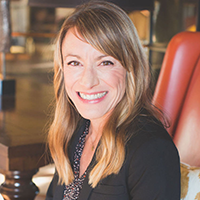
How Revealing My Mental Health Challenges Strengthened My Career

Tatro & Lopez LLP
My name is Julie Thorpe-Lopez, and I’m a trial attorney specializing in representing victims of elder abuse. Prior to practicing law, I was a social worker. I changed professions because I wanted to have a more powerful impact on protecting vulnerable populations. I love the law, and I would not trade being a litigator for any other profession. I love trial work, and there is nothing more gratifying than protecting elders from abuse. But, as a new lawyer almost 15 years ago, I was unprepared for the constant pressure and stress that is built into the legal profession.
I was a young associate when I became a mother and developed significant postpartum anxiety and depression. I knew that what I was experiencing was not normal. But I hid it because felt like somehow it was my fault. In the legal profession, we are taught that we should be able to work ourselves out of any problem. We carry a heavy burden of perfectionism. There is an expectation that we will succeed at all costs, regardless of the impact it has on us as human beings. No personal sacrifice is too big if it facilitates more rainmaking, more billable hours, or more victories in the courtroom. Those same expectations and pressures bear down on new mothers in the same way, but in a different environment. So when I couldn’t “work” myself out of anxiety and depression, I felt like I wasn’t trying hard enough or that I wasn’t doing something right. And I was afraid that if I admitted what was going on and got help, I would live in the shadow of the stigma associated with mental illness. I was afraid that if my former employer found out, I’d lose my job. These fears are not unique to postpartum mental illness; we all fear the shame and stigma associated with any mental health challenge. And we all know that these challenges are common in the legal profession.
I struggled in silence for more than a year because I feared the stigma associated with having a diagnosed mental illness. After the first year, the depression had become so profound that I started to consider the idea of checking myself into a psychiatric hospital. By then, I knew I needed to get help — regardless of any potential career repercussions. So I started therapy and started taking an anti-depressant. Once I reached out for help, I couldn’t believe how quickly these things helped me recover.
Once I had made it out of the darkness of depression, I realized that fear, shame, and stigma are terrible reasons to not get help — particularly when there are so many other legitimate barriers to treatment. Tools that can help us navigate mental health issues are available and effective, yet we feel like we can’t utilize them because we think we are the only one struggling. We blame ourselves because we think we are the only ones unable to tolerate the unrelenting weight of perfection in the legal profession. Which just is not true.
I did not lose my job. After I recovered, I was promoted to partner. Since then, we’ve achieved many millions of dollars in jury verdicts and settlements for our clients. I am a better lawyer, a better mom, and a better human for having walked through the fire of a mental illness and survived. My only regret is not getting help sooner. Shame and stigma were the only things standing in my way.
Every time I have shared my experience with a group of lawyers, at least one person will approach me afterwards and tell me that they have been through the same kind of struggle, and did so silently for fear of employment repercussions. This dynamic is unacceptable. The fear of punishment for getting help should not be standing in the way of wellness. I have the honor of serving as the Chair the San Diego County Bar Association’s Wellness subcommittee. The subcommittee works to raise awareness for lawyer wellbeing, and has spearheaded efforts to expand the California State Bar’s recognition of the importance of talking to lawyers about how to get help for mental health challenges.
I am acutely aware that some of us are not lucky enough to make it out of the darkness of depression. I wear my survivor status like a badge of honor, and there are few things of which I am more proud. I share my story so that others know that they are not alone. If it helps just one person find the courage to get help, it’s worth it. Getting help is brave, not shameful. And we all deserve to be both physically and mentally well. There is a path to overcoming mental health challenges, and the life on the other side of that struggle is worth getting to.
What can I say? This young woman suffered terribly through post partum depression for an entire year.
I couldn’t be prouder of this woman who took the journey to share her story and help new Mom’s come out of their darkness too. Kudos to you Julie 👏👏👏👏👏
PS I have suffered through periods of deep depression and it IS terrible, however, it does get better with help!!!